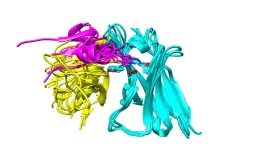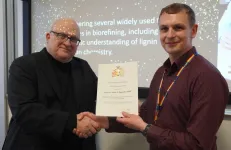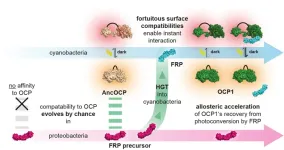(Press-News.org) The human body is capable of creating a vast, diverse repertoire of antibodies—the Y-shaped sniffer dogs of the immune system that can find and flag foreign invaders. Despite our ability to create a range of antibodies to target viruses, humans create antibodies that target the same viral regions again and again, according to a new study led by investigators from Brigham and Women’s Hospital, a founding member of the Mass General Brigham healthcare system, and Harvard Medical School. These “public epitopes” mean that the generation of new antibodies is far from random and that a virus may be able to mutate a single amino acid to reinfect a population of previously immune hosts. The team’s findings, which have implications for our understanding of immunity and public health, are published in Science.
“Our research may help explain a lot of the patterns we’ve seen during the COVID-19 pandemic, especially in terms of re-infection,” said corresponding author Stephen J. Elledge, PhD, the Gregor Mendel Professor of Genetics at the Brigham and HMS. “Our findings could help inform immune predictions and may change the way people think about immune strategies.”
Before the team’s study, there were hints, but no clear evidence, that people’s immune systems didn’t target sites on a viral protein at random. In isolated examples, investigators had seen recurrent antibody responses across individuals—people recreating antibodies to home in on the same viral protein location (known as an epitope). But the study by Elledge and colleagues helps explain the extent and underlying mechanisms of this phenomenon.
The team used a tool the Elledge lab developed in 2015 called VirScan, which can detect thousands of viral epitopes — sites on viruses that antibodies recognize and bind to — and give a snapshot of a person’s immunological history from a single drop of blood. For the new study, the researchers used VirScan to analyze 569 blood samples from participants in the U.S., Peru, and France. They found that recognition of public epitopes — viral regions recurrently targeted by antibodies — was a general feature of the human antibody response. The team mapped 376 of these commonly targeted epitopes, uncovering exactly where antibodies bind their targets. The team found that antibodies recognized public epitopes through germline-encoded amino acid binding (GRAB) motifs—regions of the antibodies that are particularly good at picking out one specific amino acid. So, instead of randomly choosing a target, human antibodies tend to focus on regions where these amino acids are available for binding, and thus repeatedly bind the same spots.
A small number of mutations can help a virus avoid detection by these shared antibodies, allowing the virus to reinfect populations that were previously immune.
“We find an underlying architecture in the immune system that causes people, no matter where in the world they live, to make essentially the same antibodies that give the virus a very small number of targets to evade in order to reinfect people and continue to expand and further evolve,” said lead author Ellen L. Shrock, PhD, of the Elledge lab.
Interestingly, the team notes that nonhuman species produce antibodies that recognize different public epitopes from those that humans recognize. And, while it is more likely for a person to produce antibodies against a public epitope, some people do produce rarer antibodies, which may more effectively protect them from reinfection. These insights could have important implications for treatments developed against COVID-19, such as monoclonal antibodies, as well as for vaccine design.
“The more unique antibodies may be a lot harder to evade, which is important to consider as we think about the design of better therapies and vaccines,” said Elledge.
Disclosures: Elledge and co-author Tomasz Kula are founders of TSCAN Therapeutics and ImmuneID. Elledge is a founder of MAZE Therapeutics and Mirimus, and serves on the scientific advisory board of Homology Medicines, TSCAN Therapeutics, MAZE Therapeutics, none of which impact this work. Shrock was a consultant for ImmuneID. Elledge and Kula are inventors on a patent application filed by the Brigham and Women's Hospital (US20160320406A) that covers the use of the VirScan library to identify pathogen antibodies in blood.
Funding: This research was supported by the SARS-CoV-2 Viral Variants Program and the Value of Vaccine Research Network, the MassCPR, the National Institutes of Health (1P01AI165072, K99DE031016, AI139538, AI169619, AI170715, and AI170580), the National Science Foundation (Graduate Research Fellows Program), Pemberton-Trinity Fellowship, Sir Henry Wellcome Fellowship (201387/Z/16/Z), Jane Coffin Childs Postdoctoral Fellowship, Burroughs Wellcome Career Award in Medical Sciences. Elledge is an Investigator with the Howard Hughes Medical Institute.
Paper cited: Shrock EL et al. “Germline-encoded amino acid-binding motifs drive immunodominant public antibody responses” Science DOI: 10.1126/science.adc9498
###
END
New research conducted by the University of Houston Conrad N. Hilton College of Global Hospitality Leadership suggests the Black Lives Matter movement had a significant, positive impact on the fundraising efforts of Black restaurateurs.
In a study published in the International Journal of Hospitality Management, the researchers found in the decade before Black Lives Matter rose to prominence, Black restaurateurs were 76% less likely to be successful in the use of crowdfunding sources, such as Kickstarter, than non-Black restaurateurs. From 2010 – 2015, funding was 72% lower for Black-owned businesses and from 2016-2020 it was 79% lower.
But that all changed ...
Professor Arthur Ragauskas awarded Royal Society of Chemistry prize
He is based at the Oak Ridge National Laboratory and University of Tennessee
He chose to receive award at Aston University because of its research into renewable resources.
Aston University has hosted a prestigious Royal Society of Chemistry prize-giving and lecture.
Professor Arthur Ragauskas of the Oak Ridge National Laboratory and University of Tennessee chose the University as the venue for this event because its research into renewable resources has inspired his work.
He is the recipient of the Society’s 2022 environment, sustainability and energy division open award: Environment ...
Professor Richard Hogg will be joining Aston Institute of Photonics Technologies
It is a leading photonics research centre, with a successful track record of scientific achievements
Professor Hogg will be focusing on research and commercialisation.
Aston University is to welcome Professor Richard Hogg who will be joining its flagship photonics research institute
He will be focusing on research and commercialisation at Aston Institute for Photonic Technologies, Aston University’s Aston Institute of Photonics Technologies (AIPT) a leading photonics research institute with a successful track record of ...
NASA and the James Webb Space Telescope industry team, led by Northrop Grumman Corporation, have won the prestigious National Aeronautic Association (NAA) Robert J. Collier Trophy for revolutionizing the field of astrophysics with the team’s pioneering design and exceptional performance of the telescope. The Collier Trophy is awarded annually for “the greatest achievement in aerospace and astronautics in America.” The award will be presented at the NAA Gala in Washington, D.C., on June 15.
“The James Webb Space ...
More than 125 international academics and industrials from 27 different countries will be joining Targeting Phage Therapy 2023 on June 1-2 in Paris. During Targeting Phage Therapy 2023, 50+ communications will be presented in the form of major talks, short orals, and posters.
Among the speakers
Targeting Phages 2023 will address how phages play a strategic role to combat infection and antibiotic resistance, but also to modulate gut microbiota. Phage enthusiasts and experts will be presenting their latest data and innovations.
Domenico Frezza, University of Roma Tor Vergata, Italy
“Phage Therapy: Vision, Gaps and Evolution”
Martha Clokie, ...
As the climate changes, many species are expected to adjust where and how they live. Some are expected to seek cooler elevations as it warms, but what happens to species already at the top of a mountain? A study of squirrels living in California’s high-elevation Sierra Nevada indicates that climate is only one factor to consider when trying to predict where an animal will make its home in a changing world.
The study, led by the University of California, Davis, is published in the journal Ecology and Evolution and was conducted in alpine regions stretching ...
DURHAM, N.C. – Most of us woke up this morning, used energy and technology to learn about the weather and the news, got a fresh cup of coffee, and went about our day informed and refreshed.
Imagine if every woman in a poor village in rural Africa or Asia could power on technology for vital information the same way. Yet, they cannot. Lack of energy access disempowers women.
Research demonstrates that empowered people are far more resilient to climate shocks and harms. While energy technology can advance resilience, it can also create new vulnerabilities. Think of disasters that can damage complex energy systems or destroy off-grid solar home systems.
A new review published in Nature ...
HERSHEY, Pa. — Black and Hispanic patients with severe allergies are less likely to get a common treatment, allergen immunotherapy, compared to white patients, according to Penn State College of Medicine researchers. They said identifying the causes, which could include being less likely than white patients to be referred to an allergist and the difficulty accessing treatment due to time and other resource constraints, and developing solutions for this health disparity, could help patients get relief from symptoms, including runny nose, congestion, post-nasal drip, sinus pain and ...
Firearm injury is now the leading cause of death among U.S. children and adolescents. As its toll grows, researchers have focused on stopping violence in the moments before it happens. But new research led by the University of Washington suggests that interventions made earlier in young people’s lives may reduce the chances of it happening at all.
The study, published April 6 in JAMA Network Open, found that UW’s Communities That Care (CTC) prevention system reduced handgun carrying among adolescents growing up in rural areas. By the 12th grade, adolescents in CTC communities were ...
Proteins are the key players for virtually all molecular processes within the cell. To fulfil their diverse functions, they have to interact with other proteins. Such protein-protein interactions are mediated by highly complementary surfaces, which typically involve many amino acids that are positioned precisely to produce a tight, specific fit between two proteins. However, comparatively little is known about how such interactions are created during evolution.
Classical evolutionary theory suggests that any new biological feature involving many components (like the amino acids that enable an interaction between proteins) ...







